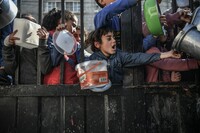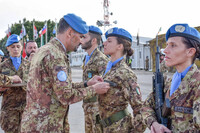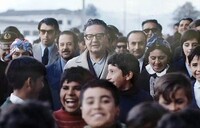Human right watch denuncia gli abusi dell'esercito USA in Afghanistan
Afghanistan: Abuses by U.S. Forces
Beatings in Detention; No Legal Process
(New York, March 8, 2004) – U.S. forces operating in Afghanistan have arbitrarily detained civilians, used excessive force during arrests of non-combatants, and mistreated detainees, Human Rights Watch said in a new report released today.
"The United States is setting a terrible example in Afghanistan on detention practices. Civilians are being held in a legal black hole – with no tribunals, no legal counsel, no family visits and no basic legal protections"
Brad Adams, executive director of the Asia division of Human Rights Watch
Human Rights Watch concludes that the U.S.-administered system of arrest and detention in Afghanistan exists outside of the rule of law. The United States is maintaining separate detention facilities at Bagram, Kandahar, Jalalabad and Asadabad military bases.
"The United States is setting a terrible example in Afghanistan on detention practices," said Brad Adams, executive director of the Asia division of Human Rights Watch. "Civilians are being held in a legal black hole – with no tribunals, no legal counsel, no family visits and no basic legal protections."
The 59-page report, "Enduring Freedom": Abuses by U.S. Forces in Afghanistan, is based on research conducted by Human Rights Watch in Afghanistan and Pakistan in 2003 and early 2004. Human Rights Watch documented cases of U.S. forces using military tactics, including unprovoked deadly force, during operations to apprehend civilians in uncontested residential areas—situations where law enforcement standards and tactics should have been used. Afghan forces deployed with U.S. forces have also mistreated persons during search and arrest operations and looted homes.
The report also details mistreatment in U.S. detention facilities. Released detainees have said that U.S. forces severely beat them, doused them with cold water and subjected them to freezing temperatures. Many said they were forced to stay awake, or to stand or kneel in painful positions for extended periods of time.
"There is compelling evidence suggesting that U.S. personnel have committed acts against detainees amounting to torture or cruel, inhumane, or degrading treatment," said Adams.
The report also describes frequent arbitrary arrests of civilians, apparently based on mistaken or faulty intelligence, and numerous cases of civilians—grocers, farmers, or laborers—who were held incommunicado and indefinitely.
Human Rights Watch said that many of the violations documented were reported in non-combat situations, and emphasized that many abuses—especially arbitrary arrests and mistreatment of detainees—were inexcusable even within the context of war.
Human Rights Watch said that Taliban and other anti-U.S. forces operating in Afghanistan had themselves violated international humanitarian law by carrying out armed attacks and abductions against civilians and humanitarian aid workers. But Human Rights Watch pointed out that under international law those violations could not serve as an excuse for U.S. violations.
"The Taliban and other insurgent groups are illegally targeting civilians and humanitarian aid workers," said Adams. "But abuses by one party to a conflict do not justify violations by the other side. This is a fundamental principle of the laws of war."
The United States has not responded adequately to questions about arrest and detention practices. In particular, Human Rights Watch raised the case of three detainees who are known to have died while in U.S. custody—two at the Bagram airbase north of Kabul in December 2002 and one at the Asadabad airbase in eastern Afghanistan in June 2003. The first two deaths were ruled homicides by U.S. military pathologists who performed autopsies on the two men. U.S. officials have yet to explain what happened to any of the three men.
"This stonewalling must stop," said Adams. "The United States is obligated to investigate allegations and prosecute those who have violated the law. There is no sign that serious investigations are taking place."
Human Rights Watch said that the United States was eroding international standards by not taking action.
"Abusive governments across the world can now point to U.S. forces in Afghanistan, and say, 'If they can abuse human rights and get away with it, why can't we?'" said Adams.
President George W. Bush and officials in his administration stated in June 2003 that the United States does not torture or mistreat detainees in the custody of the United States. But the United States has refused to allow any independent observers access to detention facilities in Afghanistan, except for the International Committee of the Red Cross, which does not report publicly on its findings. Human Rights Watch noted that some documented abuses in the report took place after President Bush's statement.
The report includes the following recommendations to the United States:
Investigate and publicly report on allegations of mistreatment at detention facilities in Afghanistan;
Instruct military and intelligence personnel to take all appropriate steps to prevent or stop abuses by Afghan forces deployed with or under the command of U.S. forces;
Create a legal system of tribunals, in conjunction with the Afghan government, to ensure that detainees in Afghanistan—both combatants and civilians—are processed and screened in accordance with applicable standards of the Geneva Conventions and human rights law;
Permit families of detainees, and those providing legal assistance, to visit detainees;
Reevaluate and revise arrest methods and standing Rules of Engagement for U.S. military and intelligence personnel in Afghanistan to ensure that law enforcement methods are used when U.S. forces are arresting non-combatants in non-combat situations.
The report also calls on Afghan President Hamid Karzai and the Afghan government to urge the United States to bring their detention system within Afghanistan into compliance with international law, and to order Afghan commanders to stop or attempt to prevent abuses during military operations.
Articoli correlati
 Cosa possiamo fare per lui
Cosa possiamo fare per luiDavid McBride, un nuovo caso Assange
In questa pagina web puoi leggere la storia di questo coraggioso avvocato militare australiano che ha denunciato i crimini di guerra in Afghanistan. E' stato condannato per aver obbedito alla sua coscienza e rivelato la verità.22 maggio 2024 - Alessandro Marescotti Sullo sfondo emerge il grande business della guerra
Sullo sfondo emerge il grande business della guerraFame, bombe e sfollamenti forzati: queste le armi del governo israeliano contro Gaza, Libano e…
Netanyahu ha bombardato ospedali e scuole, fatto morire di fame bambini, distrutto infrastrutture e alloggi e reso la vita invivibile a Gaza22 ottobre 2024 - Rossana De Simone Israele sta violando la risoluzione 1701 del Consiglio di Sicurezza ONU votata anche dagli USA
Israele sta violando la risoluzione 1701 del Consiglio di Sicurezza ONU votata anche dagli USAIl ruolo dei Caschi Blu dell'ONU in Libano: storia e attualità
Il governo israeliano "viola la risoluzione ONU", lo dice la missione ONU Unifil. E il governo Usa? Sostiene l'invasione del Libano, dopo aver dato lezioni di diritto internazionale a Putin e al mondo intero.1 ottobre 2024 - Alessandro Marescotti Le parole dello scrittore cileno Jorge Baradit Morales
Le parole dello scrittore cileno Jorge Baradit Morales"Salvador Allende era un pacifista"
"Era un pacifista che, nei momenti in cui trionfava la via armata, insisteva che la via era la pace e la democrazia. Oggi Salvador Allende è una figura mondiale al pari di Martin Luther King, Mahatma Gandhi e altri che 'in nome dell’amore' per l’umanità furono assassinati dai mercanti di morte".27 giugno 2024 - Alessandro Marescotti
Sociale.network